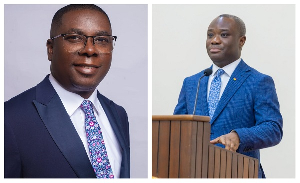Takoradi, Aug.31, GNA - The chiefs and elders of Shama, a fishing community near Sekondi in the Western Region, have appealed to the government to pay them compensation for a large track of land it acquired for development projects about three and half years ago.
The chiefs and elders have threatened that they would no longer release any parcel of land to the government unless the compensation running into millions of Ghana Cedis is paid to them.
Mr. Joshua Ananam, Secretary to the Omanhene of Shama Traditional Area, who issued the threat, said the government took a total of 10, 174 acre tract of land from the area to develop into aquaculture, high tension and thermal plant projects but never showed up again.
He was contributing to a day's forum organized in Takoradi on Monday by the Community, Land and Development Foundation (COLANDEF) a non-governmental organization on Land for stakeholders made up of chiefs, queen mothers, and opinion leaders drawn from six districts in the Western Region.
The districts are; Nzema East, Jomoro, Ellembelle, Shama, Ahanta West, Sekondi-Takoradi Metropolis.
The COLANDEF had conducted opinion poll in the six districts to collate views from the people on their expectations of the impact of the oil discovery on their lives especially, on land acquisition for development projects.
COLANDEF is implementing a six-month public education and advocacy programme in partnership with SKYY Multimedia supported by the Ghana Research and Advocacy Programme.
Mr. Anaman said the plight of the Chiefs, elders and the people have worsened by directives of the government to the effect that no one should cultivate or develop the acquired land because the projects could take off very soon.
"The sad aspect of the case is that the then Minister of Fisheries and other officials never returned therefore we do not know our position now", the Shama traditional secretary lamented.
As a result, he warned that anyone one who by-pass the Shama Traditional Council to buy land, would have it confiscated irrespective of the person's status in society.
His statement was supported by some elders from Yabiw, Abuesi, Adwoa, all in the Shama area who prayed that students in the area be offered scholarships to acquire skills that would qualify them to gain employment in the oil industry.
They expressed disappointment that the fishermen who were deprived of their livelihood following oils spills were not compensated thus abandoning them to their fate.
Madam Matilda Nkansah-Baidoo, Project Facilitator of COLANDEF, said her findings in the six districts showed that the communities had little knowledge on the impact of the oil discovery on their lives as they have not had intensive education on it.
She said apart from NGOs, government officials have not had consultations with them saying, the communities' major complaints were how their areas could be developed as well as their human resource base.
According to her, the communities complained about the deplorable road network while they demand clear explanation on the acquisition of land.
In a welcoming address, Mrs. Nana Ama Yirrah, Executive Director of the COLANDEF, called for a comprehensive framework that would seek the interest of the communities to guide the oil production.
She expressed worry that the oil production might begin without the framework in place as this was likely to compel legislators to rush and pass it laws which in the end not serve the people's interest.
Regional News of Tuesday, 31 August 2010
Source: GNA
















